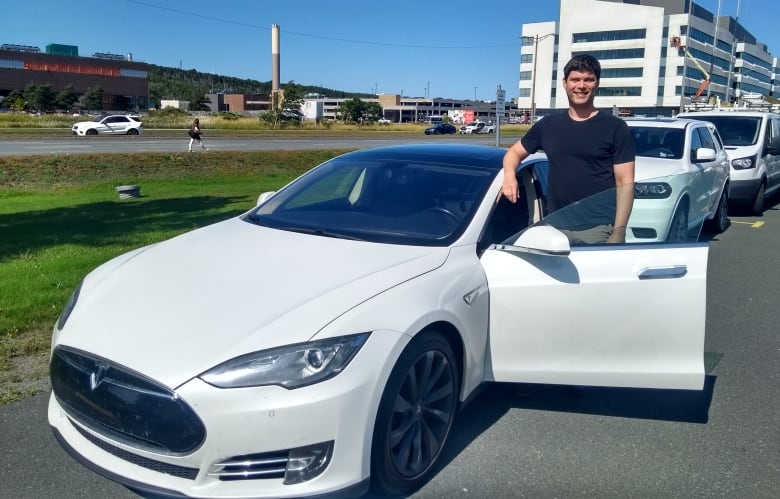Driving 3,250 kilometres for only $30, in an electric vehicle
Conservation biologist Brett Favaro says technology is there, but support infrastructure isn't

Want to drive to Quebec City from St. John's, and drop into Prince Edward Island along the way for only $30?
Conservation biologist Brett Favaro did it — all in his electric vehicle.
Favaro decided to plan a family vacation around a work trip to Fredericton to take part in a conference for the Canadian Society for Ecology and Evolution.
After boarding the Marine Atlantic ferry to get off Newfoundland, Favaro said, it was smooth sailing in terms of ease of use for driving an electric vehicle.
"We chose Argentia because there's very little charging infrastructure on the island of Newfoundland," Favaro told CBC Radio's On The Go.
"Once we got to Nova Scotia, there wasn't much planning necessary at all, because every 100 kilometres down the road or so there's a fast charging station that you can use to plug in on the highway."

According to Favaro, his car can get up to 400 kilometres on a single charge.
Charging times then vary depending on which kind of charging stations a driver encounters on the road.
The trip
In total, Favaro said he and his family drove 3,250 kilometres, which took 700 kilowatt-hours of power.
To put that into perspective, Favaro said, paying for 700 kilowatt-hours of power in Newfoundland and Labrador would cost $77.
With free charging at Tesla stations for his vehicle, and Airbnb accomodations that had EV charging stations, Favaro said he only ended up spending $30.
Favaro said the equivalent cost in a typical, gas-powered sedan would be between $300 and $400 for the same trip.

"I think about where I'm putting my money as well. Climate change is a real serious problem. I would rather give my money to the electricity utilities, and I'd rather give my money to the charge station companies than I would to the gas stations," he said.
"Nothing against the people who work at gas stations, but the industry as a whole needs to shift to renewable energy so that we can actually decarbonize our economy."
Necessary infrastructure
Favaro said there may be a negative preconception about electric vehicle technology, and some people who may believe the vehicles have limited range and charging speeds.
But Favaro said the vehicle technology is quite advanced — what's missing is the infrastructure to support them.
"The cars are fine. You have to remember we've spent 100 years and however many billions of dollars of subsidies to get the infrastructure to where it is where you can find a gas station every few hundred kilometres down the road," he said.
"We've spent so much money fighting wars to go get oil, or whether we're building gas stations and not charging for the pollution or not charging when an oil rig spills oil into the ocean. We don't bill for that. This is all what subsidizes that gas car network."
Favaro added that in five years' time, being an owner of an EV could be completely different.
"When we think about the limitations, what we're seeing is a hundred years of structure that's put all this stuff in place for gas cars, and only a handful of years for electric vehicles."
Favaro said EV owners use a website called Plug Share to figure out where charging stations are located, and plan their road trips accordingly.
"The message here is that, if you're a hotel or you're a small business owner, it's in your interest to put a charge station on your place," Favaro said.
"They only cost between $800 and $1,000 for the level two stations … and all us EV road trippers will find your hotel and we will stay at your hotel because we want to be able to charge overnight."
With files from On The Go